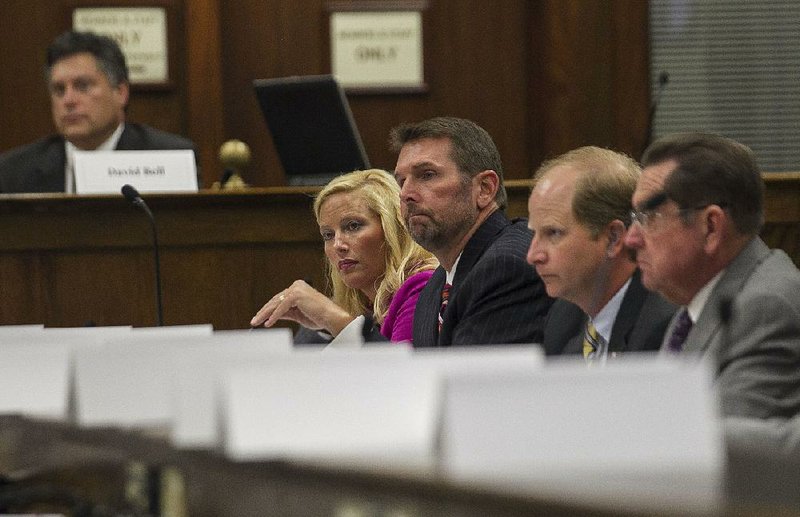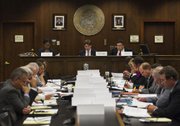In light of a dwindling funding source and a federal government stalemate, Gov. Asa Hutchinson’s highway funding working group needs to move with a greater sense of urgency, some members say.
The group, which met for the second time Tuesday, needs to meet more often and should, sooner rather than later, set a minimum target on how much more money needs to be raised for road construction and maintenance. Its recommendations, as directed by the governor, are due in December.
“Everyone at the table has acknowledged that we need more resources,” said Shannon Newton, president of the Arkansas Trucking Association. “Is there anyone sold that we don’t need more resources?”
The working group needs to “establish a goal so we know where we’re going,” said Craig Douglass, executive director of the Arkansas Good Roads Foundation, an organization that promotes better highways. “It’s [almost] Aug. 1, and it seems to me we need to be moving ahead with a specific goal in mind.”
The sense of urgency will be even greater if Congress fails to pass either a longterm highway funding bill or, as is more likely, another short-term funding extension by Friday, said state Sen. Bill Sample, R-Hot Springs, chairman of the Senate Transportation, Technology and Legislative Affairs Committee.
“If Congress doesn’t do something by the end of the week, we’re in a really big trouble,” he said. “We may have to move a lot quicker than this. We may have to move rather big time and in a hurry and ask the governor to have a special session to help us.”
Randy Zook, president and chief executive officer of the Arkansas State Chamber of Commerce, pointed to other states acting to raise money. At least half a dozen have raised taxes on gasoline by amounts ranging from 7 cents a gallon in Idaho and Washington to 21.5 cents in Georgia.
“People are raising big, real money across the country, and we’re going to be behind the eight ball if we don’t jump on this hard,” he said. “We have to do something. We have to bring the rest of the state along.”
Though no vote was taken, the group appeared to focus on the minimum amount of new money the top official at the Arkansas Highway and Transportation Department said his agency will need so it does not fall further behind in addressing road maintenance and construction needs.
Within two years, the department will need $110 million annually to be able to match future federal aid and restart its annual overlay program, an interim maintenance measure designed to extend the life of pavement on key state routes, agency director Scott Bennett told the group. The program, which typically totals $50 million a year, was dropped this year because of federal funding uncertainty.
In three to five years, the department will need another $140 million a year for an enhanced overlay program, he said. In the longer term, the department will need another $150 million to focus on maintaining the highway system and building some projects to address congestion and capacity needs. Additional work will be needed on a four-lane grid system and four-lane economic development connectors to cities with populations exceeding 5,000, he said.
Duncan Baird, the state budget administrator who was appointed by Hutchinson as group chairman, suggested the figures could be used as a “starting point.”
The group met for three hours Tuesday afternoon at the state Capitol, also hearing a detailed presentation from the state Department of Finance and Administration, which collects much of the state revenue on which the highway agency relies. Members also reviewed several pieces of legislation related to highway funding that were introduced in the regular meeting of the General Assembly earlier this year.
Hutchinson created the working group to short-circuit a fight in the legislative session earlier this year over one of those bills. House Bill 1346 would have shifted some money the state receives from sales of new cars and trucks and some road-user items gradually from the state general budget to the Highway and Transportation Department.
The shift would have applied only to a portion of money above the amount that came in the previous year and thus, proponents say, would not only have preserved the base general revenue being collected but also allowed general-revenue growth to be available to other agencies and providers.
State general revenue has risen more steeply than highway revenue, which depends primarily on fuel taxes, which have been flat while construction costs continue to rise.
Even though the bill won a committee recommendation, it still faced strong opposition from social-services organizations and higher-education representatives, whose budgets rely on state general revenue.
John Theis, the Finance and Administration Department’s assistant commissioner of revenue, provided figures Tuesday showing that total receipts collected for all motor fuel taxes declined from $455.8 million in fiscal 2004-05 to $435.7 million in fiscal 2013-14.
The Hutchinson administration also opposed the bill because of budgetary concerns and, in exchange for the bill’s withdrawal, created the working group.
“This is the reason we’re all here today,” its sponsor, Rep. Dan Douglas, R-Bentonville, a member of the group, said. “That would’ve solved a lot of problems.”
Bennett also guided the group through his department’s budget. Although the state had $670 million in state transportation-related receipts annually, the agency received about $425 million, or 63 percent of that amount. About $20.8 million of the balance goes to constitutional and fiscal agencies, $18.8 million to state roads, $86.8 million each to county roads and city streets, $18.8 million each to state-aid roads and stateaid streets and $11.9 million to nonhighway uses.
Going forward, the department expects the state portion to drop, averaging $410 million through 2019, assuming no increases. In that same time period, it projects receiving $490 million a year in state aid each year, or a total of $900 million annually.
But the federal money available for construction decreases by $134 million after taking into account fixed budget items such as maintenance, administration and operations, non-state projects and planning and research.
A total of $280 million in state money goes to maintenance, administration and operations every year through 2019. As does about $2.5 million to match federal planning and research dollars.
Another $74 million in each of those years is taken from the total amount to to help fund the $1.2 million interstate repair program voters approved in 2011, leaving a total of $410 million.
Another $180 million is set aside for bridges, federal safety improvement projects and additional money for the interstate repair program, leaving $230 million available for construction projects.
Baird, acknowledging the urgency voiced by group members, said he wanted to “take a bunch of feedback by email and figure out what we want to do in the next meeting … and solidify some of the things we talked about today.”
But whatever the group develops, Alec Farmer of Jonesboro, a member of the Arkansas Highway Commission, said it must remember others will need to be convinced of the need to raise more money, be it the Legislature or voters.
“We know what we need and we know the consequences if we don’t do it,” he said. “But we’re not the only ones who will have to be convinced of any changes.”

